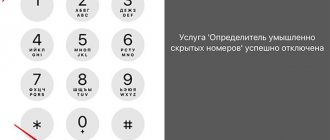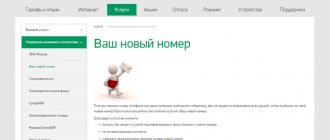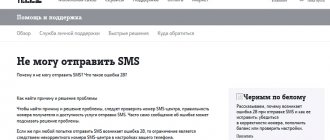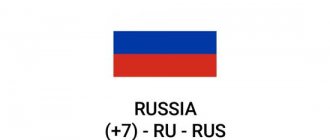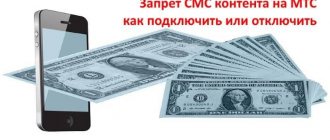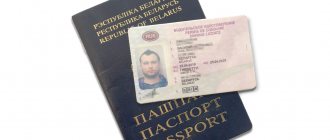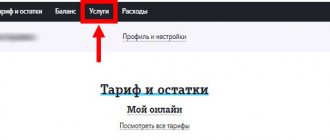I receive SMS messages from number 1453 on my personal phone. I also often receive notifications that the message was sent by me, although there was no action on my part. I am the only one who uses the phone; my operator is MTS.
Briefly about the main thing. 1453 - subscription to some paid content, it could be a game, video, music or some other service. Possibly related to the MTS widget. A number with 1307 may also come - the same song. What to do? Call the operator and ask what’s going on, you may also need to order details of the invoice - there may be the exact name of the service (ask the operator).
Updated information. Number 1453, as well as 1307, 9125 - may belong to the MTS INFO service. It is connected to all subscribers, and it is impossible to disable it. But SMS is free. And they shouldn’t write off the money - but some people do. Everything is still foggy. Important:
Complaints of this kind can be heard from many subscribers; sometimes, after receiving or sending an SMS, the account balance also ends up in the negative. This is somehow completely uninteresting, I want to know who is sending SMS, why and whether it is possible to get rid of such correspondence.
Characteristics of strange messages:
- Basically the sender number is 1453.
- Most often the SMS is not registered, the screen is blank.
- The possible text of the following plan is NULLNULLNULL.
- Instead of words, there may be strange quacks (all sorts of letters, symbols, numbers).
- Mostly SMS arrive at night, sometimes several times every half hour.
If an SMS asks you to do something - go somewhere, send an SMS, follow a link, rate a photo, video, call a number - never do anything. Most likely this is a pure scam. Also be careful if you indicate your number somewhere or send an SMS to a short number to pay for something - make sure that they don’t deduct money from you later!
How did she subscribe if I didn’t connect anything?
Nowadays, it is already “considered the norm” to pay for something that you did not connect. What we mean is that very often there is an instruction somewhere in small print on the website, or you have to dig through the menu for a long time, where this is also indicated. It feels like this is being done on purpose so that you don’t notice and the money goes into their account. In this case, the operator has nothing to do with it, since it is indicated that he is aware of the existing paid content. However, it does not provide paid services, but this is all done by other organizations. There are organizations that offer you good content and charge you for it. Often you receive SMS with news or some innuendo, you open them and bam - minus on your account. The operator is supposedly “clean”, but he withdraws the money himself. They rent out such short four-digit numbers as apartments for rent, and everyone has their own percentage. This is the system.
What it is?
SMS from numbers 1453 and 1307 is an automatic option from MTS Info, which applies to all subscribers. By default, messages sent and received from these short numbers are free, although sometimes money is withdrawn from the balance for this transaction.
SMS to numbers 1453 and 1307 from the MTS operator
To be more specific, this sending is necessary for the transfer of service information within the MTS Info service. This information should be understood as dynamic updates for the application and SIM card menu. In addition to the indicated numbers, others may be presented - 9125, 9118, 9091, 4674, 111.
These messages can also signal the activation of paid subscriptions to entertainment (educational) content from MTS. They are issued by sending any text to short numbers “1453” and “1307”, respectively; charges for use occur daily from the moment of connection.
Users may also receive messages from the same numbers, with the example text “content not supported” or “NULLNULLNULL”. There is no need to worry - these are the same system alerts.
SMS from numbers 1453 and 1307
Unlike a subscription, here the money will be withdrawn once. They are removed only if you respond to this SMS, follow their link or write a response. The money goes to the same circle of people. It is worth noting that there are not only two of them, but a whole system of people. Starting from wholesalers purchasing numbers and ending with the same operator.
In general, if a user of his own free will wants to use a paid service, then he can open an account. This will be a separate invoice for this type of service, where everything is clearly stated “where and for what”. And if the money runs out there, then your personal mobile account remains safe and sound. But for this, of course, you need to try and go to the MTS office. Take your passport with you and register officially. Few people would agree to this.
Method of “connecting” paid content
Upon a superficial examination of the situation, it may seem that the “automatic” connection of useless materials is to blame for a virus that got onto the smartphone after visiting dubious sites.
In fact, such a scenario is quite real - the user simply clicks on an advertising banner, clicks on another with the text “Ok/Agree,” and charges his number, and quite a lot at that.
But this is absolutely not the case - we will try to explain why with an example. Judging by the detailed story of one of the MTS subscribers, subscriptions to numbers 1453 and 1307 managed to independently register his GSM relay.
Such SMS are needed to transmit service information
In simple terms, a man installed a SIM card from the MTS operator to automate his country gate. This mechanism is aimed at receiving messages with special commands; it cannot send or redirect them. As a result, judging by the account statement, a real miracle happened - first the system received messages from various short numbers, including 1453 and 1307, and then sent replies.
This step activated paid subscriptions, the cost of which varies from 4 to 8 rubles per day. There is no doubt about the story - the user provided screenshots from the statement of the number, in which dozens of incoming and outgoing messages are clearly visible.
How to get your money back and unsubscribe
Make sure you didn't accidentally click on the link or agree. If you have nothing to do with paid connections, then follow these steps. Log in to your personal account, or call the support service, the same operator. This will not happen without a fight, especially if you accidentally connected it yourself. You will have to prove that you are right and that you did not notice, since they have it in small print, etc. But according to statistics, there are quite a lot of cases with the return of spent funds, even to those who connected themselves.
To unsubscribe, the most common and relevant method is to send an SMS message “stop” or “stop”.
What do MTS operators think about this?
Absolutely nothing. Internet assistants avoid direct questions about how such a situation became possible, if “A subscription can be issued only with the consent of the owner of the number.”
According to a specialized search on the official website of the mobile operator, these short numbers do not appear at all, although during a long conversation, assistants point out the openness of subscriptions, their popularity, and the like.
Link to search for services using a short number - moskva.mts.ru/uslugi-po-korotkim-nomeram.
legislation
Is there any basis for such claims, strictly speaking? After all, at some point the user voluntarily performed some action that ensured his place as a victim in the chain (relative to the short number 1307). This is precisely the position that telecom operators adhere to when a subscriber, outraged by the loss of money, begins to search for the truth.
The answer is yes, there is
And this is called the federal law of July 23, 2013 N 229-FZ “On Amendments to the Federal Law “On Communications”.
In it, Article 2 of the Basic Law is supplemented with subclause 34.1, which defines what “content services” are.
The legislator made this definition as general as possible, practically fitting into it everything that is not the actual connection. Those. if the user using the phone and through the telecom operator’s channels receives, quote,
...reference, entertainment and (or) other additionally paid information...", gets the opportunity "... to participate in voting, games, competitions and similar events...,
Then he, the user, receives a content service. And it, in turn, being provided with the participation of third parties, falls under the addition of paragraph 5 of Article 44 of the Federal Law “On Communications”, which prescribes a mechanism for protecting the consumer by:
- firstly, the possibility of creating, at his request, a separate account to pay only for content services;
- secondly, the requirement to obtain explicit consent to receive such services;
- thirdly, about comprehensive information, including prices and names of suppliers, about these services before obtaining consent.
Another addition, established by 229-FZ, to paragraph 5 of Article 54 of the Basic Law, states that services provided in violation of any of the above are not subject to payment. And finally, Article 68 of the main communications law is supplemented by paragraph 8, which directly indicates the operator’s responsibility for the implementation of Article 44 (see above).
Let’s summarize the legislative information, projecting the rights and responsibilities spelled out in it onto the practical side of life.
If the user consciously wants to become a consumer of content services, then you can secure your account for paying for communications by declaring your intention to open a separate content account to cover the costs of mobile subscriptions and SMS from short numbers. If it is exhausted, funds intended for regular conversations and SMS will not be affected.
For telecom operators Beeline and TELE2, this action is automated and is carried out by sending a USSD request, *110*5062# and *160#, respectively. Sets of commands are also provided for replenishment and checking the balance.
Megafon and MTS require a personal appearance at the office and presentation of a passport, and one must understand that regardless of the method of expression of will, the very fact of opening an account confirms voluntary consent to receive content services, and strictly speaking makes it unnecessary to inform about the details (in including price) of the same mobile subscription.
What does the short number mean and what is it for?
It is already clear that the short number 1453 belongs to MTS. It is clear that messages (incoming and outgoing) are sent automatically. Number 1453 is connected to every MTS subscriber. If the latter wishes to receive any content of an educational or entertaining nature, then it is with the help of this number that he can subscribe. This is done very quickly, almost instantly, and is not always a conscious decision of the subscriber:
- A man is traveling in a vehicle and hears an SMS signal.
- I was busy with important things, and at that time a message arrived.
- SMS messages often arrive at night.
- The actions of a person - he looks because he is worried, what if something important happens.
- It is in this case that there is a high probability of mistakenly clicking the Agree button instead of Refuse.
- The job is done, money will be written off regularly.
Today, advertising of various kinds literally attacks from everywhere, and very skillfully, skillfully and professionally, masquerading as various innocent services. And it is obvious that it is unlikely that such a reputable company as MTS has anything to do with the write-off of funds. It’s just that technology is developing so rapidly that one automation can be successfully defeated by another, more aggressive one.
Who gets your money
So, it is clear that the user is the loser. In this case, where does the river of benefit flow, i.e. user money? - in general terms it is said above. And this, of course, is a simplification that there are only two beneficiaries; in fact, the schemes are many times more complex.
They contain so-called aggregators - wholesale purchasers of short numbers and holders of mutual settlement schemes with telecom operators. The aggregators are grouped around the already mentioned content providers who own sites where the sale of services is organized and partners who collect and provide the entire scheme with traffic.
Therefore, they are unlikely to return the money voluntarily, without a fight. And in view of the fact that the burden of proving compliance or non-compliance with the same Federal Law No. 229 lies on the party making a claim for the loss incurred, you need to understand what can be stated as evidence. It is unlikely that any of us keep print screens of every manipulation with the phone, and it is unlikely that the warning about the payment of the service is difficult to read, because it is printed in gray font on an even grayer background, will serve as a weighty argument.
What has been said, of course, does not mean that there is no need to try, it is absolutely necessary, and the Internet is replete with stories about successful disputes.
Why is the SMS empty?
There is no clear answer to this question, but it is logical to assume that there is no text, since the MTS operator does not communicate anything personally to the subscriber, and the latter is not obliged to answer anything. Therefore, the content is not supported - these are purely service messages. However, SMS messages continue to travel back and forth several times a day.
Another question is why money is written off from the account, and not so rarely. Most likely, the phone user subscribed to paid services, although many subscribers claim that they did not.
Judging by people's complaints, subscriptions of this type have become regular recently. When detailing (the service is available to any subscriber), it turns out that the money was not charged in favor of MTS, the illegality of writing it off is recognized and the money is returned.
But why bother with details every time, if you can once and for all ban absolutely all short numbers. So, we call the operator and voice our request, rather an indignant demand. However, as it turned out, this is not a solution. There may be situations when you need the help of the MTS helpline, but if the service is disabled, most likely you will not get through to them!
Who does the money go to?
This question is not so easy to answer, since there may be a certain number of links in the chain between the mobile communications provider and the subscriber.
For example, aggregators that purchase short codes in large quantities. The next link in the chain may be content providers providing paid services and traffic flow.
How do they know my number and how to turn off these SMS?
In any case, it is necessary to take action and figure out if money leaves the account. It is unlikely that it will be possible to cope with automatic SMS, which do not harm anyone and are part of the service, since they work for every MTS subscriber by default. Therefore, the subscriber’s number is known, because the message comes from the operator.
In order not to feed paid subscriptions, from which you, as they say, neither sleep nor mind, you can resort to the following actions:
- First, find out if there are active subscriptions. How to do this - combination *152*2#. You can find out more information on the official MTS website.
- Create a separate account for paid content. Do not replenish the balance. No paid subscription will be activated if there is no money in the account.
- Contact the MTS operator with a request to disable the paid content service.
- As noted above, you can ban short codes altogether. Again, it is better to clarify the appropriateness of this action with the operator.
What is number 7763 on MTS?
MTS number 7763, which frightens many subscribers, is the phone number of the “Easy Payment” service. The operator has had such a project for several years, reminiscent of a conventional electronic payment system.
With its help, people make charitable contributions, transfer money to friends, or pay off bills for:
- mobile communications and landline telephone;
- Internet and TV;
- rent;
- loans;
- transport;
- shopping and entertainment.
After ordering the service on https://pay.mts.ru and filling out the details, the owner of the number receives an SMS with a code to confirm the operation. A set of characters arrives with exactly 7763 and is accompanied by a request to send 0 to cancel or any other character to make a payment. In this way, the company takes care of the safety of funds in clients’ accounts, but this does not always work.
Subscribers willingly provide the code from SMS to scammers who pose as MTS employees. They follow dubious links and transmit data to viruses. And they realize what they have done only when the money has already disappeared from the account.
About dangerous Android applications and precautions
Modern scammers resort to sophisticated money theft schemes that involve the use of software with built-in virus files. In order to minimize the risk of infection, it is worth adopting the following safety rules:
- It is not recommended to download and install dubious applications from Google Play.
- In your smartphone settings, you need to block installation from unknown sources.
- You should carefully study reviews of applications before installing them.
It is very important to check all unfamiliar short numbers (such as 6954).
What conclusion do we draw?
Service SMS from MTS (every operator has them) themselves are unlikely to be malicious, since the interests of the mobile operator do not at all pursue the goal of fooling their subscribers. But if there is a financial leak, it is definitely necessary to figure it out. You should definitely order detailed messages and calls - this is the best way to clarify something in a conflict situation.
In my personal opinion, you need to be very careful when using modern gadgets. The optimal subscriber behavior is to not agree with anything, not to click OK or Agree on any suspicious messages or updates. Such caution will only bring benefits; no one and nothing extraneous and encroaching on your money will penetrate your phone.
And if you need to connect some kind of information or entertainment service at your own request, then there are no problems with this today. Fortunately, we are all literate people.
To home! SMS 10/19/2017
NVIDIA image sharpening - what is it, how to configure it? BSS Multiplatform Plugin - what is this program? NvNodeLauncher - what is it? (nvnodejslauncher.exe, NVIDIA NvNode Launcher) NVIDIA Battery Boost - what is it? NvBatteryBoostCheckOnLogon - what is this task? com.android.partnerbrowsercustomizations.tmobile - what is it? (Android) Letasoft Sound Booster - what is this program and is it needed? Processor with or without graphics core, which is better?
What kind of SMS is this from MTS?
They come and that’s fine, they don’t bother anyone. If so, then it’s not so bad. Although it also looks strange - it sends an SMS to someone without the owner’s knowledge. It seems like an empty message, but it does mean something. Maybe some confidential information is leaking from the phone. Good is not enough.
And it’s really bad if money floats away along with SMS. Let's figure it out. As expected, number 1453 belongs to the MTS operator and is a service number. Used to exchange official information. Even more detailed - the information concerns the dynamic updating of certain applications, as well as the menu available on the SIM card.
If anything, submit a request for a printout of all the services used, demand from the operator, you need to figure it out:
Mobile subscription to number 1453
If it happened that money began to be debited from the account regularly, daily and in equal amounts, and the owner of the phone, it would seem, did nothing specifically for this, most likely a paid mobile subscription was issued to his number - read what this is below
Its essence is that the cellular user has somehow agreed to receive regular information for a fee, for example, you received an SMS on your phone from the above number with the text: “send SMS...”. At the same time, information such as: what kind of service, what kind of subscription, what kind of website, the cost of the subscription, how to delete a subscription or how to disable it is often not directly shown.
Someone, a partner of your operator, called a content provider in professional slang, supplies you with content for a fee:
- provides information
- provides a service by providing access to an online game, website, program, etc.
